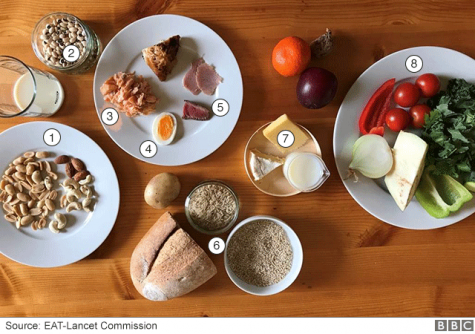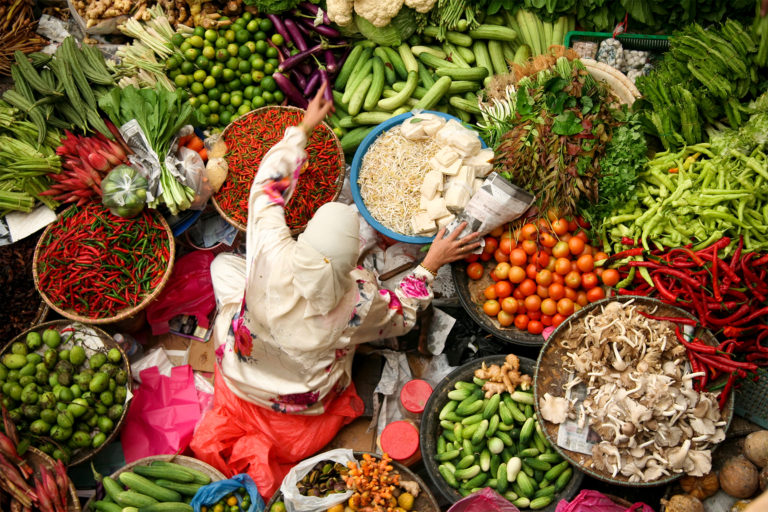A Diet To Save People And Planet
January 17, 2019
For many, dieting is a common method to control one’s weight and health, however, now that the EAT-Lancet Commission has released their new diet, dieting may also be used to save lives.
The EAT-Lancet Commission on Healthy Diets from Sustainable Food Systems (which shall be referred to as EAT-Lancet) is a group of 37 scientists from an amalgam of nations. They are made of experts in fields ranging from nutrition to farming, to climate change who all share the same aspiration to create and define goals, specifically international dietary goals, that are both healthy and environmentally sustainable.
To help mitigate the effects of climate change by reducing the production of greenhouse gas emissions, EAT-Lancet has delivered what they call “the first full scientific review of what constitutes a healthy diet from a sustainable food system, and which actions can support and speed up food system transformation” (eatforum.org). While many may enjoy their current consumption, the modern production and consumption of food pose a threat to the global climate. Food systems are a major source of greenhouse gas emissions (30%) and pollution, use more freshwater than any other industry (70%), destroy more wildlife than any other industry, and use enormous amounts of land (40% of global land) to name a few of its detrimental effects. Furthermore, on the end of consumption, increasingly unhealthy diets prove to be the leading risk factor for disease worldwide including heart disease and cancer. Moreover, there are over 2 billion adults who qualify as medically overweight or obese. Simultaneously, however, chronic malnutrition affects approximately 10.7% of the global population (worldhunger.org). These issues emphasize the necessity for an altering of the global diet.
To preface the diet itself, it is imperative that the world consumes smaller quantities of meat — specifically grain-fed livestock — in a frequency less than the current. Plant-based substitutes will not only reduce food’s environmental impact but aid in the amelioration of global health. Additionally, it is intended to feed 10 billion people — the expected global population for the year 2050 — and will prevent the deaths of about 11 million individuals annually.
Listed below is what can be expected for a typical day, although, there are many variations on this list:
- Nuts – 50g
- Legumes – 75g (e.g. beans, chickpeas, lentils)
- Fish – 28g
- Eggs – 13g
- Meat – 14g of red meat and 29g of chicken
- Carbs – 232g of whole grain (e.g. bread, rice) and 50g of starchy vegetables (e.g. potatoes)
- Dairy – 250g
- Vegetables – 300g and Fruit – 200g
This image provides a visual representation of this list:

The diet does allow for an additional 31g of sugar and 50g of oils in its daily allotment.
Of course, one of the most common concerns with altering one’s diet would be the taste. Would one still be able to eat what one wants? In short, the answer is no. As outlined above, the allotment for red meat provides for about one burger every week or a single, monthly, large steak. For much of the developed world, there will also be a reduction in the amount of fish and chicken consumed weekly.
While the type of food consumed may be changed, Professor Walter Willett from Harvard University is confident that “There is tremendous variety there… You can take those foods and put them together in thousands of different ways. We’re not talking about a deprivation diet here, it is healthy eating that is flexible and enjoyable.” The picture below shows a series of dishes that would abide by the dietary restrictions.

While to date there has not been an attempt to alter global consumption on this level, EAT-Lancet is optimistic about the future applications of their diet. This diet should help save both lives and the planet by reducing greenhouse gas emissions, protecting biodiversity, preserving natural ecosystems, reducing agricultural land-use, and preserving water. Furthermore, it will help individuals maintain a healthy lifestyle by consuming nutritious foods in realistic quantities.
Actions taken by the global community in the present will be some of the most influential on the future that the world will share. It is imperative that the world takes action towards diminishing the impact that climate change has on our world and following this diet is a mode in which individuals can help promote a better world. In an almost selfish argument for altruism, it is in the best interest of every individual to comply with these dietary restrictions because it will not only ameliorate their current health but provide a better world for themselves. The effects of climate change ignore borders and complaints. It is essential that the global community acts in unison to protect humanity.






